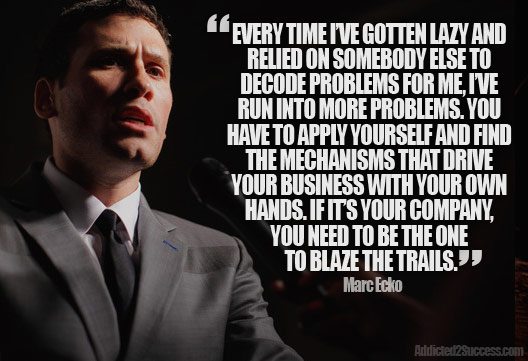Success Advice
10 Tips From Marc Ecko For Real-World Social Networking
Not digital, but real-world social networking. If your goal is to grow your personal brand into a public persona, the subtle, mysterious stranger approach is most often not going to cut it. There are only so many people that can pull off the J. D. Salinger route of becoming famous for not being seen. The easier (though more painful) route is to hire a publicist—more explicitly, hire yourself—and will yourself to want to impress the red-carpeted world of celebrities, CEOs, and Twitter famous.
I can’t hold your hand at the events, but here are ten tips for surviving them:
The following 10 tips are an excerpt from Unlabel: Selling You Without Selling Out. Order your copy today!
Analog Social Networking 101
1. Value Quality over Quantity
Your publicist will give you a social calendar that’s jammed with events, insisting that you “need to be” at all of them. This is false. Separate the “need to attends” from the “nice to attends,” and this will serve you better in the long run. Chasing the second tier of events will exhaust you and overexpose you, and you’ll burn out faster than yesterday’s news.
2. Don’t Overtly Parrot
Most of the management books tell you to parrot the person you’re trying to impress, suggesting that you nod when she nods, touch your left nostril when she touches her left nostril, and then if she says, “I love Lady Gaga!” you say, “Oh my God, I love Lady Gaga too!!!!” The world does not need more parroting, and it’s okay to not love Lady Gaga.
3. Use Mints
If, at any point in the day, your mouth has been open and if you’ve consumed food, chances are that your breath stinks. Do yourself a favor and freshen up your face.
4. Don’t Name-Drop
It’s transparent and obnoxious. When I met George Lucas, even though at heart I was a starstruck fan boy, I would never say, “I saw Harrison Ford last week!” or “I just played golf with Steven Spielberg!” Lame. If you do want to slip in a name, it’s better to use a name that’s more mundane, more grounded, like the celebrity’s lawyer or dentist that you might happen to know.
5. Never Ask for a Card
You can (and should) give out your business card, but never ask for one in return. If people want to give you a card, they’ll give you their god-damn card.
6. Respect the Handler
The notable might have a handler (assistant, publicist, manager, associate) standing with him or her at the party. When you meet the notable, also introduce yourself to the sidekick, and when you give the notable a card, give the sidekick a card too. Treat handlers with respect. Not only is this the right thing to do, but this could be the hand of the king—and they’ll later whisper into the king’s ear.
7. Drink Water
This is work, it’s not a party.
8. Don’t Try to Speak to Everyone
When Barry Sanders scored a touchdown, he would casually toss the football back to the ref, shrugging, and living by the credo “Act like you’ve been there before.” Just chill out. Don’t try to meet every celebrity and shake every hand. If you are conducting and managing your personal brand well, part of your brand will be to spend more time in this mildly toxic environment. You’ll be at these events again in the future, so let things happen more organically.
9. It’s Not About Being a “Closer”
Lower your expectations about imagining that you may magically seal any deals. These events aren’t the right forum for giving someone the hard sell, for overt pitching, or to become someone’s best friend.
10. Know That They’re Working Too
Even famous people don’t like getting dressed up and making a fuss about how they look. Even if they have a giant dick or won the Most Beautiful Woman in the World award, the chances are that they still had anxiety about getting dressed up and going to this event. It’s work for them too. Take comfort in this.

Business
The Simple Security Stack Every Online Business Needs
Most small businesses are exposed online without realising it. This simple protection stack keeps costs low and risks lower.

Running a business online brings speed and reach, but it also brings risk. Data moves fast. Payments travel across borders. Teams log in from homes, cafés, and airports. (more…)
Business
If Your Business Internet Keeps Letting You Down, Read This
From smoother operations to better security, dedicated internet access is quietly powering today’s high-performing businesses.

Today, a dependable internet service is the bedrock for uninterrupted business operations. Many organizations rely on stable online connections for communication, data transfer, and customer interaction. (more…)
Did You Know
How Skilled Migrants Are Building Successful Careers After Moving Countries
Behind every successful skilled migrant career is a mix of resilience, strategy, and navigating systems built for locals.

Moving to a new country for work is exciting, but it can also be unnerving. Skilled migrants leave behind familiar systems, networks, and support to pursue better job opportunities and a better future for their families. (more…)
-

 Health & Fitness2 weeks ago
Health & Fitness2 weeks agoWhat Minimalism Actually Means for Your Wellness Choices
-

 News1 week ago
News1 week agoBrandon Willington Builds 7-Figure Business by Ignoring Almost Everything
-

 Did You Know2 weeks ago
Did You Know2 weeks agoWhy Most Online Courses Fail and How to Fix Them
-

 Business2 weeks ago
Business2 weeks agoIf Your Business Internet Keeps Letting You Down, Read This
-

 Business3 days ago
Business3 days agoEntrepreneur’s Guide to Pay Stubs: Why Freelancers and Small Business Owners Need a Smart Generator
-

 Business2 days ago
Business2 days agoThe Simple Security Stack Every Online Business Needs
-

 Finances2 days ago
Finances2 days agoWhy Financial Stress Is One of the Biggest Barriers to Personal Growth
-

 Scale Your Business1 day ago
Scale Your Business1 day ago5 Real Ways to Grow Your User Base Fast



























6 Comments